

Examples:

Chinese, Song Dynasty (960-1279), Mallow-shaped plate in rose purple glaze, glazed porcelain, Jun ware, height 3.3 cm, mouth diameter 19.5 cm, foot diameter 8 cm, Henan Museum, China. Unearthed at Fangcheng, Henan Province. "Jun ware is named after Junzhou where it was produced, and the site of the ruined kiln has been discovered in the present Yuzhou City, Henan Province. The basic color of the Jun ware is sky blue. The technique of yaobian is often used, which refers to the changes of tints of colors by control of the temperature of the kiln."

China, Plate with Grape Vine Decoration, Ming dynasty, 1403-1424,
blue and white glazed porcelain, Museum für Ostasiatische
Kunst, Berlin.

China, Bottle-shaped Vase, Ming dynasty, early
15th century, porcelain with underglaze-blue decoration,
Worcester Art Museum, MA.

Meissen Factory (manufacturer), German, Two
Harlequins, c. 1740, porcelain, height
17.5 cm, Industrial Art Museum, Berlin.

Nicholas Lecroux (Belgium, Tournay, 1733-99),
Pair of Potpourri Vases, c. 1760, porcelain,
height 9 inches (22.9 cm),
Los Angeles County Museum of Art.

France, Sèvres, Royal Porcelain Factory,
after a model by Étienne-Maurice Falconet (French, 1716-1791), based on
a drawing by François Boucher (French, 1703-1770), The Teaching
of Love (L'Education de L'Amour or L'Amour Precepteur), 1763,
soft-paste biscuit porcelain figurine, 11 5/8 x 9 7/16 x 9 5/8
inches (29.5 x 24 x 24.5 cm), Cincinnati Art Museum, OH.

France, Sèvres, Royal Porcelain Factory,
about 1769, Pair of Lidded Vases, painted reserves
attributed to Jean-Baptiste-Etienne Genest, porcelain painter,
soft-paste porcelain, blue Fallot ground,
gilding, gilt-bronze
mounts, 3 feet 6 1/4 x 3 feet 3 3/4 x 1 foot 2 inches (107.3
x 101 x 35.5 cm), J. Paul Getty Museum, Malibu, CA. See vase.
Josiah Wedgwood (English, 1730-1795), Staffordshire, Etruria Factory, Pieces from the Green Frog Service, Queen's Ware, 1773-1774, porcelain painted in brown enamel with frogs in green, Hermitage Museum, St. Petersburg, Russia.

France, Sèvres, Royal Porcelain Factory, Pieces from the Cameo Service, 1778-1779,
Hermitage Museum, St. Petersburg, Russia.

Karl L. H. Mueller (American, c. 1820-1887,
Brooklyn, NY), Centennial Vase, 1877, porcelain, 12
3/4 x 10 1/4 inches (32.4 cm x 26.0 cm), Metropolitan Museum
of Art, NY.
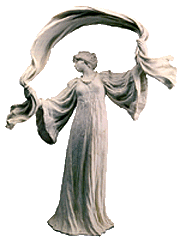
Agathon Léonard (French, 1841-1923) for Sèvres, Royal Porcelain Factory, Dancing Figure from the Table Centrepiece 'Dance with Scarves', 1900, bisque porcelain, height 47.5 cm, Hermitage Museum, St. Petersburg, Russia. This figure is one of fourteen in a set of female figures dancing and playing music. See Art Nouveau and drapery.
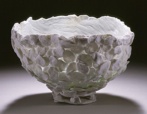
Rudolf Staffel (United States, 1911-), Light Gatherer, 1989,
porcelain, translucent copper oxide wash, height 5 1/2 inches (14 cm), diameter 9 inches (22.9 cm), Los Angeles County Museum of Art.

Ruth Duckworth (English, 1919-), Untitled (Wall Sculpture), 1997, porcelain, 23 1/2 x 56 x 6 inches (59.7 x 142.2 x 15.2 cm), Los Angeles County Museum of Art.
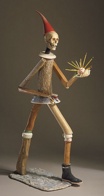
Richard Shaw (American, 1941-), Happy Birthday, 1996, porcelain, glaze, overglaze decals, 69 1/2 x 15 1/2 x 31 1/2 inches (176.5 x 39.4 x 80.0 cm), Los Angeles County Museum of Art.
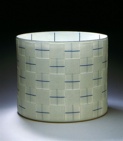
Bodil Manz (Danish, 1943-), Cylinder with Blue Lines, 1996, porcelain, transfers, height 7 1/2 inches (19.1 cm), diameter 9 inches (22.9 cm), Los Angeles County Museum of Art. Also see cylinder.
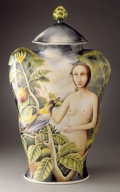
Kurt Weiser (American, 1950-), Bird Call, 1998,
porcelain, height 18 1/2 inches (47.0 cm), diameter 11 1/2 inches (29.2 cm)
Also see ceramics, chinoiserie, collectible, earthenware, lead glaze, pug mill, stoneware, and terra cotta.
https://inform.quest/_art